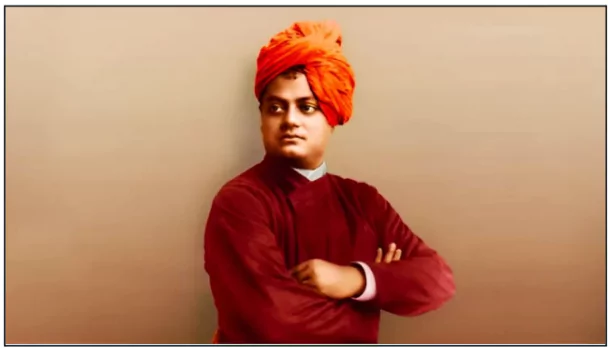National Youth Day is observed in India every year on January 12 to honour the ideals of Swami Vivekananda who was born on January 12, 1863, in Kolkata.
- 12th of January 2025 marks the 162nd birth anniversary of Swami Vivekananda, and is celebrated as National Youth Day.
About National Youth Day 2025
- Objective
-
- To involve youth in various activities and to promote spirit of service and volunteerism.
- It is hosted by the Ministry of Youth Affairs & Sports, in partnership with one of the States or Union Territories (UTs).
- The theme for the NYF 2025 is “Youth for a Sustainable Future: Shaping the Nation with Resilience and Responsibility“.
Enroll now for UPSC Online Classes
About Swami Vivekananda

- Initially his name was Narendra Nath Dutta, born on January 12, 1863, in Kolkata.
- Swami Vivekananda was the chief disciple of 19th century mystic and yogi Ramakrishna Paramhansa.
- He founded the Ramakrishna Math in 1897, a monastic order based on his guru’s teachings in Kolkata and a worldwide spiritual movement known as the Ramakrishna Mission based on the ancient Hindu philosophy of Vedanta.
- Swami Vivekananda is considered one of the great Indian monks who enlightened the Western world about Hinduism.
- As a disciple of Sri Ramakrishna Paramahansa, he pushed for national integration in colonial India and is credited with reviving Hinduism in the nation.
Swami Vivekananda’s Early Life and Spiritual Awakening
- Showed an early interest in Western philosophy, history, religion, and spirituality. Swami Vivekananda was Well-read in various subjects and meditated in front of Hindu deities’ images.
- Met Ramakrishna Paramhansa, who became his Guru, and remained devoted to him until Ramakrishna’s death in 1886.
- Adopted the name ‘Vivekananda’ in 1893 at the request of Maharaja Ajit Singh of the Khetri State, changing from his previous name ‘Sachidananda.’
- Literary Works: Wrote books like Raja Yoga, Jnana Yoga, and Karma Yoga.
- Death: Passed away on July 4, 1902.
Contributions Of Swami Vivekananda
Swami Vivekananda’s achievements left a lasting impact on society. He worked tirelessly to improve humanity, promote spiritual enlightenment, and cultivate harmony, social justice, and interfaith understanding.
- Introduction of Indian Philosophies: Swami Vivekananda played a crucial role in introducing the world to Indian philosophies, particularly Vedanta and Yoga.
- He preached a philosophy called “neo-Vedanta,” which provided an interpretation of Hinduism through a Western lens.
- Vivekananda believed in the harmony between spirituality and material progress.
- Emphasis on Education: Swami Vivekananda laid significant emphasis on education as a means of regenerating India.
- He advocated for a holistic and character-building education system that aimed at shaping individuals to become self-reliant and morally upright.
- World Parliament of Religions: Swami Vivekananda gained global recognition for his remarkable speech at the World Parliament of Religions in Chicago in 1893.
- He introduced Hinduism to America and called for religious tolerance and an end to fanaticism at the Parliament.
- His address highlighted the universality of religions, emphasizing the need for religious tolerance, harmony, and the unity of humanity.
- Pathways to Liberation: In his books, Swami Vivekananda expounded on the four paths to attaining liberation (moksha) from worldly attachments and pleasures:
- Raja Yoga, Karma Yoga, Jnana Yoga, and Bhakti Yoga.
- He provided practical insights into these paths to guide individuals on their spiritual journeys.
- Influence on Modern India: Swami Vivekananda’s ideas and teachings deeply influenced modern India.
- Netaji Subhas Chandra Bose referred to him as the “maker of modern India.”
- Vivekananda’s emphasis on self-confidence, national pride, and spirituality instilled a sense of purpose and revitalized the nation.
Associated Organizations of Swami Vivekananda
- Ramakrishna Mission: As the chief disciple of Ramakrishna Paramahansa, Swami Vivekananda established the Ramakrishna Mission in 1897.
- This organization focuses on value-based education, cultural preservation, healthcare, women’s empowerment, youth and tribal welfare, and relief and rehabilitation efforts.
- Belur Math: In 1899, Swami Vivekananda established Belur Math as his permanent abode.
- Belur Math serves as the headquarters of Ramakrishna Math and Ramakrishna Mission, providing a spiritual sanctuary and a hub for disseminating Vivekananda’s teachings.
- Advaita Ashrama: Swami Vivekananda founded the Advaita Ashrama in Mayavati, Uttarakhand, to encourage the study and practice of Advaita Vedanta philosophy.
- The ashrama concentrates on book printing and distribution, spiritual retreats, and educational and healthcare initiatives.
- Vedanta Society: Swami Vivekananda inspired the establishment of Vedanta Societies in the United States and other regions of the world.
- These organizations endeavor to improve their understanding of Vedanta philosophy and to provide a forum for spiritual seekers to investigate its teachings.
- Bharat Sevashram Sangha: Swami Vivekananda encouraged the formation of the Bharat Sevashram Sangha, despite the fact that it was not created by him.
- This group places an emphasis on altruistic service to humanity, addressing societal issues through educational, medical, and relief efforts.
Check Out UPSC NCERT Textbooks From PW Store
Government Initiatives and Schemes For Youths
| Scheme/Initiative |
Objective |
Key Targets/Details |
| Nehru Yuva Kendra Sangathan (NYKS) |
Develop youth personality and engage in nation-building activities |
- Core Programs funded by NYKS’s budget
- Youth Affairs Schemes: NPYAD and NYLP
- Collaborative Projects funded by other ministries
- Special programs for youth issues.
|
| National Young Leaders Programme (NYLP) |
Foster youth leadership and innovation for socio-economic development |
- Institutional platform for youth to address community and social issues
- Promote awareness and engagement in contemporary issues
|
| National Programme for Youth and Adolescent Development (NPYAD) |
Financial support for youth and adolescent development |
5 major Components
- Leadership training
- National integration programs
- Adventure activities
- Adolescent development
- Technical and resource development
|
| National Youth Policy (NYP-2024) |
Set a 10-year vision for youth development aligned with SDGs |
- Focus on education, employment, leadership, health, and social justice
- Aligned with NEP 2020
- Promote inclusion, mental health, and fitness
|
| National Youth Corps (NYC) |
Create disciplined youth to facilitate inclusive growth and act as community role models |
- Disseminate information and knowledge
- Enhance public ethics and dignity of labor
|
| National Youth Awards |
Recognize exemplary contributions of youth and NGOs |
- Individual award: ₹1,00,000, a medal, and a certificate
- Organization award: ₹3,00,000, a medal, and a certificate
|
| National Service Scheme (NSS) |
Promote community service with the motto “NOT ME, BUT YOU” |
- Foster leadership, social responsibility, and national integration
- Encourage links between institutions and communities
|
| Youth Hostels |
Promote travel, exploration, and cultural exchange |
- Affordable accommodations for youth
- Managed by Central government-appointed wardens
|
| International Cooperation |
Develop international perspectives among youth and collaborate on youth-related issues |
- Collaborate with United Nations Volunteers (UNV)/ United National Development Programme (UNDP) and the Commonwealth Youth Programme (CYP)
- Collaboration with UNICEF for Skill training and employment initiatives since 2020
|
![]() 13 Jan 2025
13 Jan 2025


